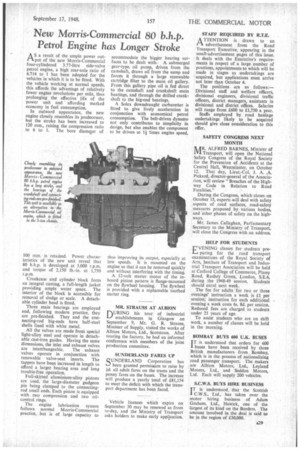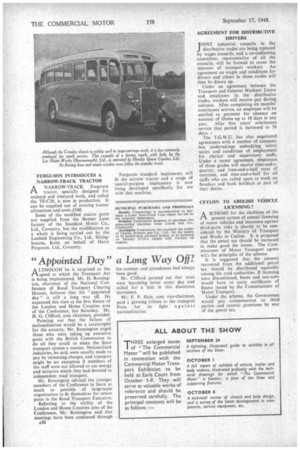New Morris. Commercial 80 b.h.p.
Page 31

Page 32

If you've noticed an error in this article please click here to report it so we can fix it.
Petrol Engine has Longer Stroke
AS a result of the ample power output of the new Morris-Commercial four-cylindered 3.77-litre side-valve petrol engine, a high rear-axle ratio of 6.714 to 1 has been adopted for the vehicles in which it is to be fitted. With the vehicle working at normal speeds, this affords the advantage of relatively fewer engine revolutions per mile, thus prolonging the effective life of the power unit and affording marked economy in fuel consumption.
In outward appearance, the new engine closely resembles its predecessor, but the stroke has been increased to 120 mm., raising the compression ratio to 6 to 1. The bore diameter of 100 mm. is retained. Power characteristics of the new unit reveal that 80 b.h.p. is developed at 3,000 r.p.m. and torque of 2,150 lb.-in. at 1,750 r.p.m.
Crankcase and cylinder block form an integral casting, a full-length jacket providing ample water space. The interior of the block is accessible for removal of sludge or scale. A detachable cylinder head is fitted.
Three main bearings are employed and, following modern practice, they are pre-finished. They and the connecting-rod big-ends have half-steel shells lined with white metal.
All the valves are made from special light-alloy steel and operate in detachable cast-iron guides. Having the same dimensions, the inlet and exhaust valves are interchangeable. The exhaust valves operate in conjunction with renewable valve-seat inserts. The tappets have been increased in length to afford a larger bearing area and long trouble-free operation.
Full-skirted aluminium-alloy pistons are used, the large-diameter gudgeon pin being clamped to the connectingrod small ends. Each piston is equipped with two compression and two oilcontrol rings.
The engine lubrication system follows normal Morris-Commercial practice, but is of large capacity to accommodate the bigger bearing surfaces to be dealt with. A submerged gear-type, oil pump, driven from the camshaft, draws oil from the sump and forces it through a large renewable cartridge filter to the main oil gallery. From this gallery pipe oil is fed direct to the camshaft and crankshaft main bearings, and through the drilled crankshaft to the big-end bearings.
A Solex downdraught carburetter is fitted to give lively acceleration in conjunction with economical petrol consumption. The belt-driven dynamo not only contributes to simplicity in design, but also enables the component to be driven at 1 limes engine speed, thus improving its output, especially at low speeds. It is mounted on the engine so that it can be removed quickly and without interfering with the timing.
A 12-volt starter motor of the inboard pinion pattern is flange-mounted on the flywheel housing. The flywheel is provided with a replaceable toothed starter ring.
MR. STRAUSS AT ALBION
DURING his tour of industrial establishments in Glasgow on September 9, Mr. G. R. Strauss, Minister of Supply, visited the works of Albion Motors, Ltd., Scotstoun. After touring the factory, he had an informal conference with members of the joint production committee.
SUNDERLAND FARES UP
QUNDERLAND Corporation has t•--) been granted permission to raise by id. all adult fares on the trams and the penny fares on the buses. The increase will produce a yearly total of £81,154 to meet the deficit with which the transport department has been faced.
Vehicle licences which expire on September 30 may be renewed as from to-day, and the Ministry of Transport asks holders to make early application. STAFF REQUIRED BY R.T.E.
ATTENTION is drawn to an advertisement from the Road Transport Executive, appearing in the small-advertisement pages of this issue. It deals with the Executive's requirements in respect of a large number of positions, appointments to which will be made in stages as undertakings are acquired, but applications must arrive not later than October 4.
The positions are as follows:— Divisional staff and welfare officers, divisional engineers, divisional traffic officers, district managers, assistants in divisional and district offices. Salaries will range from £600 to £1,750 a year.
Staffs employed by road haulage undertakings likely to be acquired should give close consideration to this offer.
SAFETY CONGRESS NEXT MONTH
ft AR. ALFRED BARNES, Minister of IV/ Transport, will open the National Safety Congress of the Royal Society for the Prevention of Accidents at the Central Hall, Westminster, on October
12. That day, Lieut.-Col. J. A. .A. Pickard, director-general of the Association, will review "Breaches of the Highway Code in Relation to Road Fatalities."
During the Congress, which closes on October 15, experts will deal with safety aspects of road surfaces, road-safety measures proposed by various bodies, and 'other phases of safety on the highways.
Mr. James Callaghan, Parliamentary Secretary to the Ministry of Transport, will close the Congress with an address.
HELP FOR STUDENTS
EVENING classes for students preparing for the road transport examinations of the Royal Society of Arts, Institute of Transport and Industrial Transport Association will be held at Catford College of Commerce, Plassy Road, Rushey Green, London, S.E.6, during the 1948-49 session. Students should enrol next week.
The fee for adults for two or three evenings' instruction a week is LI per session; instruction for each additional evening a week costs 6s. 8d. per session. Reduced fees are charged to students under 21 years of age.
To assist students who are on shift work, a number of classes will be held in the morning.
BOMBAY BUYS 600 U.K. BUSES
IT is understood that orders for 600 I buses have been received by three British manufacturers from Bombay, which is in the process of nationalizing road passenger transport. The makers are Albion Motors, Ltd., Leyland Motors, Ltd., and Seddon Motors, Ltd. Each will supply 200 vehicles.
S.C.WS. BUYS HIRE BUSINESS IT is understood, that the Scottish I C.W.S., Ltd., has taken over the motor hiring business of Adam Graham, Ltd., Hawick, one of the largest of its kind on the Borders. The amount involved in the deal is said to be in the region of £30,000.
FERGUSON INTRODUCES A NARROW-TRACK TRACTOR ANARROW-TRACK Ferguson tractor, specially designed for orchard and vineyard work, and called the TE-C20, is now in production. It can be supplied out of existing tractor allocations and costs £360.
Some of the modified tractor parts are supplied from the Banner Lane factory of the Standard Motor Co., Ltd., Coventry, but the modification as a whole is being carried out by the Lenfield Engineering Co., Ltd., Sittingbourne, Kent, on behalf of Harry Ferguson, Ltd., Coventry. Ferguson standard implements will fit the narrow tractor and a range of special-purpose implements is now being developed specifically for use with that machine. AGREEMENT FOR DISTRIBUTIVE DRIVERS
JOINT industrial councils in the distributive trades are being replaced by wages councils, and a co-ordinating committee, representative of all the councils, will be formed to cover the interests of transport workers. An agreement on wages and conditions for drivers and others in those trades will then be drawn up.
Under an agreement between the Transport and General Workers' Union and employers in the distributive trades, workers will receive pay during sickness. After completing six months' continuous service, an employee will be entitled to payment for absence on account of illness up to 18 days in any year. After five years' continuous service that period is increased to 36 days. .
The T.G.W.U. has also negotiated agreements with a number of company bus undertakings embodying salary scales and conditions of employment for clerical and supervisory staffs. Under a recent agreement, employees of those grades will receive time-and-aquarter, and time-and-a-half rates of overtime, and time-and-a-half for all staffs who are called upon to work on Sundays and bank holidays as part of their duties.




















































































